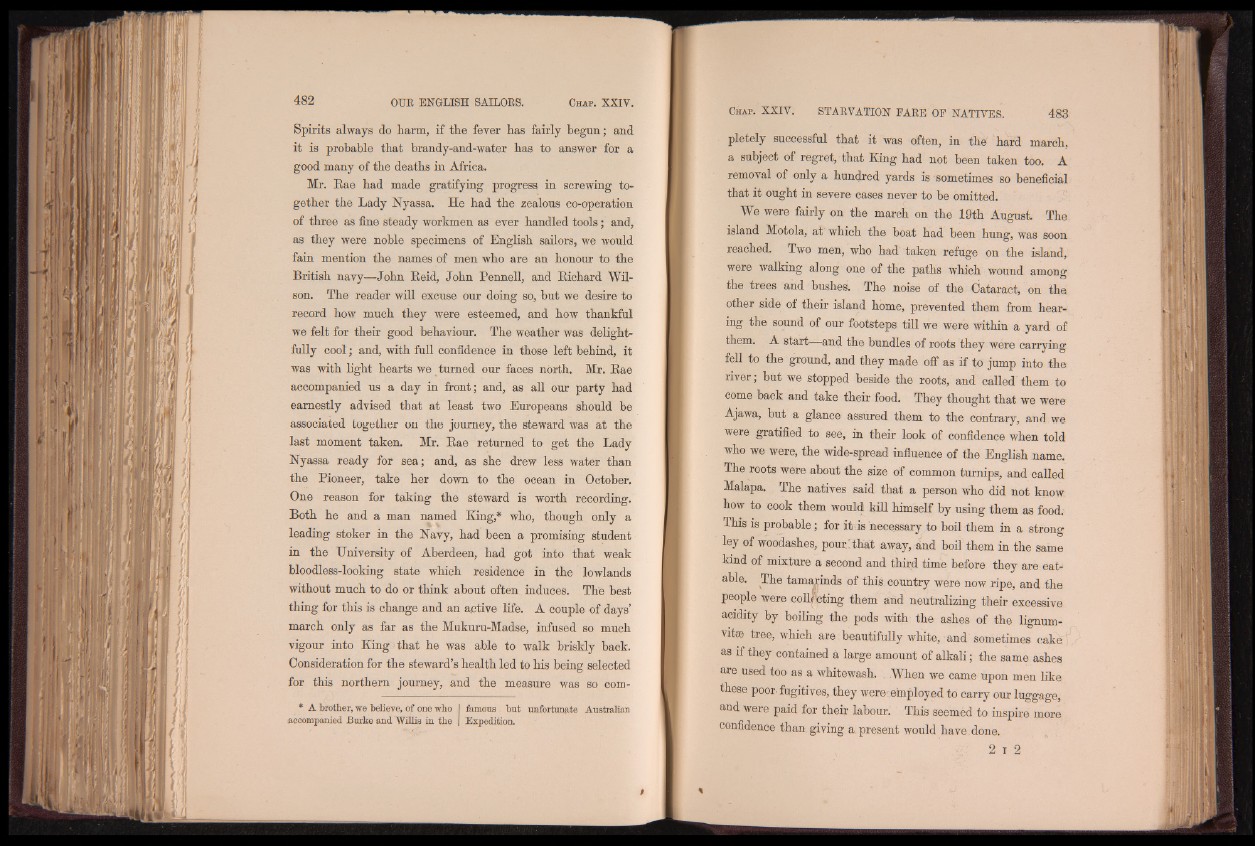
Spirits always do harm, if the fever has fairly begun; and
it is probable that brandy-and-water has to answer for a
good many of the deaths in Africa.
Mr. Bae had made gratifying progress in screwing together
the Lady Nyassa. He had the zealous co-operation
of three as fine steady workmen as ever handled tools; and,
as they were noble specimens of English sailors, we would
fain mention the names of men who are an honour to the
British navy—John Beid, John Pennell, and Bichard Wilson.
The reader will excuse our doing so, hut we desire to
record how much they were esteemed, and how thankful
we felt for their good behaviour. The weather was delightfully
cool; and, with full confidence in those left behind, it
was with light hearts we turned our faces north. Mr. Bae
accompanied us a day in front; and, as all our party had
earnestly advised that at least two Europeans should be
associated together on the journey, the steward was at the
last moment taken. Mr. Bae returned to get the Lady
Nyassa ready for sea; and, as she drew less water than
the Pioneer, take her down to the ocean in October.
One reason for taking the steward is worth recording.
Both he and a man named King,* who, though only a
leading stoker in the Navy, had been a promising student
in the University of Aberdeen, had got into that weak
bloodless-looking state which residence in the lowlands
without much to do or think about often induces. The best
thing for this is change and an active life. A couple of days’
march only as far as the Mukuru-Madse, infused so much
vigour into King that he was able to walk briskly back.
Consideration for the steward’s health led to his being selected
for this northern journey, and the measure was so com-
* A brother, we believe, of one who I famous but unfortunate Australian
accompanied Burke and Willis in the | Expedition,
pletely successful that it was often, in the hard march,
a subject of regret, that King had not been taken too. A
removal of only a hundred yards is sometimes so beneficial
that it ought in severe cases never to be omitted.
We were fairly on the march on the 19th August. The
island Motola, at which the boat had been hung, was soon
reached. Two men, who had taken refuge on the island,
were walking along one of the paths which wound among
the trees and bushes. The noise of the Cataract, on the
other side of their island home, prevented them from hearing
the sound of our footsteps till we were within a yard of
them. A start—and the bundles of roots they were carrying
fell to the ground, and they made off as if to jump into the
river; but we stopped beside the roots, and called them to
come back and take their food. They thought that we were
Ajawa, but a glance assured them to the contrary, and we
were gratified to see, in their look of confidence when told
who we were, the wide-spread influence of the Engli«L name.
The roots were about the size of common turnips, and called
Malapa. The natives said that a person who did not know
how to cook them would bill himself by using them as food.
This is probable; for it is necessary to boil them in a strong
ley of woodashes, pour: that away, and boil them in the same
kind of mixture a second and third time before they are eatable.
The tamarinds of this country were now ripe, and the
people were colh'cting them and neutralizing their excessive
acidity by boiling the pods with the ashes of the lignum-
vitae tree, which are beautifully white, and sometimes cake
as if they contained a large amount of alkali; the same ashes
are used too as a whitewash. . When we came upon men like
these poor fugitives, they were-employed to carry our luggage,
and were paid for their labour. This seemed to inspire more
confidence than giving a. present would have done.
2 i 2